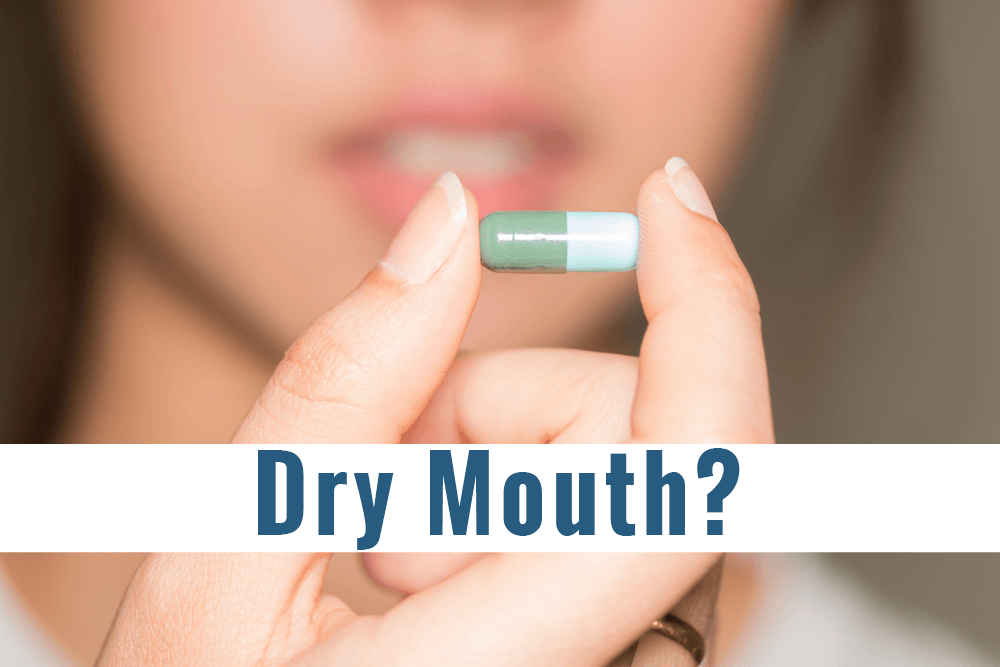
Occasionally having a dry mouth is uncomfortable, but generally, it isn’t a serious issue. However, when you experience dry mouth frequently, it can have a serious impact on your teeth, as well as an overall effect on your oral health. Some of the signs of dry mouth are:
- Mouth feels sticky and potentially grainy
- Halitosis (bad breath)
- Develop sores on and in mouth
- Difficulty when speaking, chewing, tasting, and swallowing
- Dentures aren’t fitting well
- Dry and cracking lips
- Inflamed gums
- Irritated and dry tongue
Dry mouth can be caused by a number of things, from salivatory issues to illness. But what many of our patients here at Riverside Dental Care don’t realize is that their medication may be the source of their dry mouth.
Medications That Can Harm Your Oral Health
There are a number of medications that can impact your oral health. Sometimes, the side effect is that it dries out your mouth, while in other cases, your teeth or gums are directly affected. Some of the most common medications that can harm your oral health are:
- Asthma medications – Some types of asthma medications can be highly acidic. As this acidic medicine makes contact with your tooth enamel, it can erode the enamel and irritate your gums.
- Medicinal syrups – To help alleviate the taste, medicinal syrups are typically packed with sugar, which can increase tooth decay if your teeth aren’t cleaned after taking the syrup medicine.
- Antidepressants – There are many types of antidepressants, and all of them will cause dry mouth, which increases the likelihood of tooth decay and other issues.
- Bisphosphonates & monoclonal antibodies – The use of these antibodies can lead to ulcers to develop around the jawbone as well as oral thrush.
- Aspirin – If you swallow your aspirin as directed, you won’t have issues. However, for those who chew their aspirin or leave it to dissolve in their mouth, the aspirin can damage tooth enamel, as it is acidic.
- Oral contraceptives – Some oral contraceptives can trigger an increase in gum issues.
- Chemotherapy medications – There are a number of oral health issues linked with chemo medications, such as oral inflammation, dry mouth, and gum issues like infection.
- Antihistamines – Using antihistamines increases your risk of gum problems and can dry out your mouth.
- Immunosuppressive medications – Like with chemo medications, immunosuppressive medications can trigger oral infections and gum issues.
- Antihypertensives – The use of antihypertensives can cause your gums to swell and overgrow.
What You Can Do To Protect Your Teeth From Dry Mouth
It is likely that if you are taking the above medications, you need them and can’t just stop taking them to prevent dry mouth. So, first, you should make sure you go to your twice-a-year dental cleanings so that our dentists can monitor your oral health.
Along with keeping up with your dental cleanings, here are some other ways you can protect your teeth and gums from dry mouth problems:
Focus on drinking water
Water is the best hydrator when it comes to combating dry mouth. It doesn’t have anything that can contribute to further tooth decay—unlike sugary sports drinks, acidic soda, etc.—and by regularly drinking water, you can stimulate your salvatory glands.
Also, if you choose tap water as your drinking water, you can also reinforce your teeth with fluoride-enriched water. Some regions don’t add fluoride to the water, but if you live in an area that does, you can get an extra layer of protection for your teeth.
Chew sugar-free gum with xylitol
Chewing gum can help get your saliva going, but if you chew sugary gum, the benefits are minimal since you are putting sugar directly on your teeth. But, you can reclaim those benefits by chewing gum with xylitol.
Not only is chewing gum with xylitol sugar-free, but xylitol is also known to help combat tooth decay. So, not only can you correct dry mouth, but you can protect your teeth!
Brush teeth with fluoride toothpaste
Brushing your teeth with toothpaste that contains fluoride is an important aspect when it comes to dealing with dry mouth. While toothpaste alone won’t correct the dryness, the fluoride in the toothpaste can help protect your teeth from decay.
As a natural mineral, fluoride can remineralize your teeth—to a certain extent—and help prevent tooth decay from setting in while you work on fixing your dry mouth.
Rinse after taking acidic medication
If you are required to take an acidic medication, it is important that you rinse with water after taking the medication. That way, the acid doesn’t stay on your teeth to wear down the enamel and dry out your mouth. You also should do this after taking medicinal syrups to prevent sugar from staying on your teeth.
Discuss concerns with the doctor and your dentist
For those individuals who need to take long-term medications but have concerns about dry mouth, be sure to discuss your concerns with your doctor and your dentist. Depending on your circumstance, different solutions may be offered, from dental sealants to lower dosages.
If you need help with your dry mouth or have just been reminded that it’s time to come in for your biannual dental cleaning, feel free to contact us today. Our dental staff is ready to help you enjoy a happy, healthy mouth!



Leave a Reply